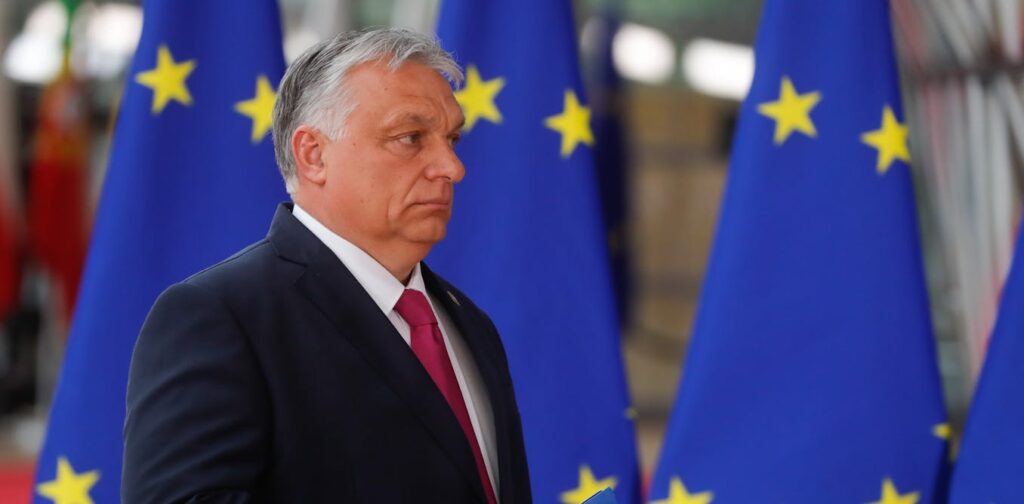The European Commission has stripped Hungary of €1.04 billion in aid in the latest phase of its ongoing political battle with the errant member state.
While the amount lost is a blow for Hungary, the decision also has broader economic and geopolitical implications. Hungarian Prime Minister Viktor Orbán has consistently ignored EU standards and democratic principles. The question now is whether he has exhausted his options.
The European Union mobilizes and redistributes huge amounts of collective funds to poor countries and regions. From the 1970s onwards, a complex set of financing instruments emerged under the banner of ‘cohesion policy’.
For the 2021-27 budget period, the EU allocated €392 billion for cohesion policy, supplemented by €750 billion in grants and low-cost loans from the Next Generation EU programme. These funds can be used to support infrastructure development, environmental protection, and the private sector (especially the green economy).
No other regional agency does this. For poor countries, these funds can amount to a significant portion of their GDP, and distributing such large funds gives the European Commission potential leverage.
The EU is also notable as an organization for making support for democratic values and the rule of law a prerequisite for membership. The party sees itself as a bulwark of liberal values and constitutionalism, and there should be no room for authoritarians.
However, the EU has been slow to enforce this rule under President Orbán. After coming to power in 2010, the Hungarian Prime Minister began implementing various repressive and nepotistic measures to increase his personal power and that of the ruling party (Fidesz).
Mr. Orbán was even accused of directly using EU funds for these purposes. For a time he was protected by members of the European Parliament’s powerful European People’s Party (EPP), developing his own form of populist Euroscepticism while raking in funds from Brussels.
Eventually, he went too far and alienated his former allies (he left the EPP group in 2021), as the Commission began taking action against him.
In 2020, the European Commission introduced a rule of law conditionality mechanism, making it much easier to suspend or withdraw funds from member states if there are concerns about their commitment to democracy. This was used against Poland and Hungary in 2022. Just to name a few stakes, the former had a total of 136 billion euros unblocked when the new government agreed to Brussels’ terms.
Hungary also froze more than 30 billion euros during the same period. A cat-and-mouse game ensued, with President Orbán threatening to block European Union action to support Ukraine, and at times using the national veto. In December 2023, in a rather tortuously worded decision, the €10.2 billion cohesion fund was unfrozen, just before a key vote on aid and accession for Ukraine. However, a further €20 billion was still pending.
Prime Minister Orbán with European Commission President Ursula von der Leyen and European Council President Antonio Costa. EPA
The Commission’s report on the rule of law in Hungary in July 2024 found that although the Orbán government had made some reforms (under pressure), there were still systemic problems around issues such as judicial and media independence. He pointed out that he was pointing out that
At the time, Hungary also held the EU Presidency (which rotates every six months). Orbán used this position to promote himself on the world stage, visiting Moscow and Beijing to promote a different view of “Europe” and further troubling the EU leadership.
next move
It should be noted that the decision to deprive Hungary of 1.04 billion euros is in some sense a technical issue. Funds will be automatically withdrawn two years after the suspension begins. But nevertheless, this is very important because it means that the status quo will not continue. Without changes, Hungary could permanently lose its remaining funds.
The implications of this are wide-ranging. The EU has been accused of tolerating authoritarians within its ranks, but things are clearly changing. But the situation is changing as more and more xenophobic populists come to power in the EU.
Will the Commission be able to maintain its strict approach, or will pressure from the government ease? Donald Trump is a warm ally of Orbán, but it is unclear whether he is willing or able to help Hungary in this type of conflict. If he were to challenge it, it would show that there is some substance to the idea of a global xenophobic populist alliance.
President Orbán himself is furious about the funding loss and has threatened to use his national veto more aggressively, something he has done in the past. Given Hungary’s economically fragile position, it is unclear how much conflict it can withstand.
Meanwhile, opposition to Orbán is growing in Hungary, with rising opposition leader Piotr Magyar seeking to “unlock” billions in EU funds that are still due. I declared that I could do it. This could be a powerful election slogan (the next one is expected to be announced in 2026). It would also amount to the EU entering Hungary’s domestic political sphere in a very concrete way.


